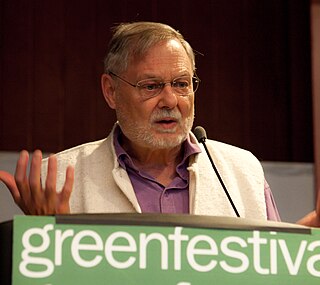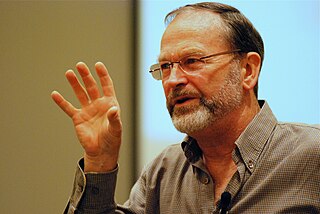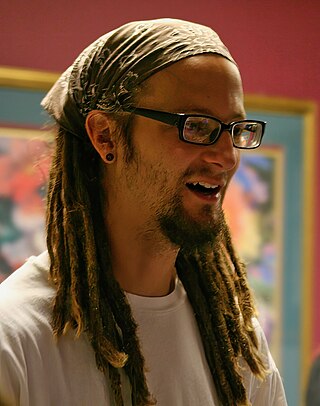
KISS, an acronym for "Keep it simple, stupid!", is a design principle first noted by the U.S. Navy in 1960. First seen partly in American English by at least 1938, KISS implies that simplicity should be a design goal. The phrase has been associated with aircraft engineer Kelly Johnson. The term "KISS principle" was in popular use by 1970. Variations on the phrase include "keep it super simple", "keep it simple, silly", "keep it short and simple", "keep it short and sweet", "keep it simple and straightforward", "keep it small and simple", "keep it simple, soldier", "keep it simple, sailor", "keep it simple, sweetie", "keep it stupidly simple", or "keep it sweet and simple".

An ecovillage is a traditional or intentional community that aims to become more socially, culturally, economically and/or environmentally sustainable. An ecovillage strives to have the least possible negative impact on the natural environment through the intentional physical design and behavioural choices of its inhabitants. It is consciously designed through locally owned, participatory processes to regenerate and restore its social and natural environments. Most range from a population of 50 to 250 individuals, although some are smaller, and traditional ecovillages are often much larger. Larger ecovillages often exist as networks of smaller sub-communities. Some ecovillages have grown through like-minded individuals, families, or other small groups—who are not members, at least at the outset—settling on the ecovillage's periphery and participating de facto in the community. There are currently more than 10,000 ecovillages around the world.

Simple living refers to practices that promote simplicity in one's lifestyle. Common practices of simple living include reducing the number of possessions one owns, depending less on technology and services, and spending less money. In addition to such external changes, simple living also reflects a person's mindset and values. Simple living practices can be seen in history, religion, art, and economics.

Scott Nearing was an American radical economist, educator, writer, political activist, pacifist, vegetarian and advocate of simple living.

Walden is an 1854 book by American transcendentalist writer Henry David Thoreau. The text is a reflection upon the author's simple living in natural surroundings. The work is part personal declaration of independence, social experiment, voyage of spiritual discovery, satire, and—to some degree—a manual for self-reliance.
The ecological footprint measures human demand on natural capital, i.e. the quantity of nature it takes to support people and their economies. It tracks human demand on nature through an ecological accounting system. The accounts contrast the biologically productive area people use to satisfy their consumption to the biologically productive area available within a region, nation, or the world (biocapacity). Biocapacity is the productive area that can regenerate what people demand from nature. Therefore, the metric is a measure of human impact on the environment. As Ecological Footprint accounts measure to what extent human activities operate within the means of our planet, they are a central metric for sustainability.

William Ernest McKibben is an American environmentalist, author, and journalist who has written extensively on the impact of global warming. He is the Schumann Distinguished Scholar at Middlebury College and leader of the climate campaign group 350.org. He has authored a dozen books about the environment, including his first, The End of Nature (1989), about climate change, and Falter: Has the Human Game Begun to Play Itself Out? (2019), about the state of the environmental challenges facing humanity and future prospects.
In social behavior, downshifting is a trend where individuals adopt simpler lives from what critics call the "rat race".

Edward James "Ed" Begley Jr. is an American actor and environmental activist. He has appeared in hundreds of films, television shows, and stage performances. He played Dr. Victor Ehrlich on the television series St. Elsewhere (1982–1988). The role earned him six consecutive Primetime Emmy Award nominations and a Golden Globe Award nomination. He also co-hosted, along with wife Rachelle Carson, the green living reality show titled Living with Ed (2007–2010), and recurred as Dr. Grant Linkletter in Young Sheldon (2019–2024).

Duane Elgin is an American author, speaker, educator, consultant, and media activist.

Marc Cooper is an American journalist, author, journalism professor and blogger. He is a contributing editor to The Nation. He wrote the popular "Dissonance" column for LA Weekly from 2001 until November 2008. His writing has also appeared in such publications as the Los Angeles Times, The Atlantic Monthly, Harper's Magazine, The New Yorker, The Christian Science Monitor, Playboy and Rolling Stone.

Guillermo Gómez-Peña is a Mexican/Chicano performance artist, writer, activist, and educator. Gómez-Peña has created work in multiple media, including performance art, experimental radio, video, photography and installation art. His fifteen books include essays, experimental poetry, performance scripts, photographs and chronicles in both English, Spanish and Spanglish. He is a founding member of the pioneering art collective Border Arts Workshop/Taller de Arte Fronterizo (1985-1992) and artistic director of the performance art troupe La Pocha Nostra.

Sir Jonathon Espie Porritt, 2nd Baronet, CBE is a British environmentalist and writer. He is known for his advocacy of the Green Party of England and Wales. Porritt frequently contributes to magazines, newspapers and books, and appears on radio and television.

William Rees, FRSC, is Professor Emeritus at the University of British Columbia and former director of the School of Community and Regional Planning (SCARP) at UBC.

Robert C. Ludwig is a retired American mastering engineer. He mastered recordings on all the major recording formats for all the major record labels, and on projects by more than 1,300 artists, including Led Zeppelin, Lou Reed, Metallica, Queen, Jimi Hendrix, Bryan Ferry, Paul McCartney, Nirvana, Bruce Springsteen, TOOL and Daft Punk, with more than 3,000 credits. He is the recipient of 13 Grammy and other awards. Ludwig retired in 2023.

Shane Claiborne is an American evangelical Christian and founder, an author and organizational leader. He is one of the founders of the non-profit organization, The Simple Way, in Philadelphia, Pennsylvania, cofounder of the Red-Letter Christians, and has been described as a founder, as well, of the New Monastic movement. Moreover, Claiborne is referred to in the press as an activist, given his advocacy for nonviolence and service to the poor. Among other writings, he is the author of the book, The Irresistible Revolution: Living as an Ordinary Radical (2006).

Earth Overshoot Day (EOD) is the calculated illustrative calendar date on which humanity's resource consumption for the year exceeds Earth’s capacity to regenerate those resources that year. In 2024, it fell on 1 August. The term "overshoot" represents the level by which human population's demand overshoots the sustainable amount of biological resources regenerated on Earth. When viewed through an economic perspective, the annual Earth Overshoot Day represents the day by which the planet's annual regenerative budget is spent, and humanity enters environmental deficit spending. Earth Overshoot Day is calculated by dividing the world biocapacity, by the world ecological footprint, and multiplying by 365, the number of days in a year:
Ted (F.E.) Trainer is an Australian academic, author, and an advocate of economic degrowth, eco-anarchism, simple living, and 'conserver' lifestyles. He is a retired lecturer from the School of Social Work, University of New South Wales. He has written numerous books and articles on sustainability and is developing Pigface Point, an alternative lifestyle educational site near Sydney.
Will Bonsall is an American author, seed saver and veganic farmer who lives in Maine. He is a regular speaker about seed saving, organic farming and veganic farming.

Piers Taylor is a British chartered architect and co-presenter of BBC Two series such as The House That £100k Built and The World's Most Extraordinary Homes. His work has received awards from the Architects' Journal and the Royal Institute of British Architects. His approach to design is characterised by simplicity, cost-effectiveness and sustainability.















